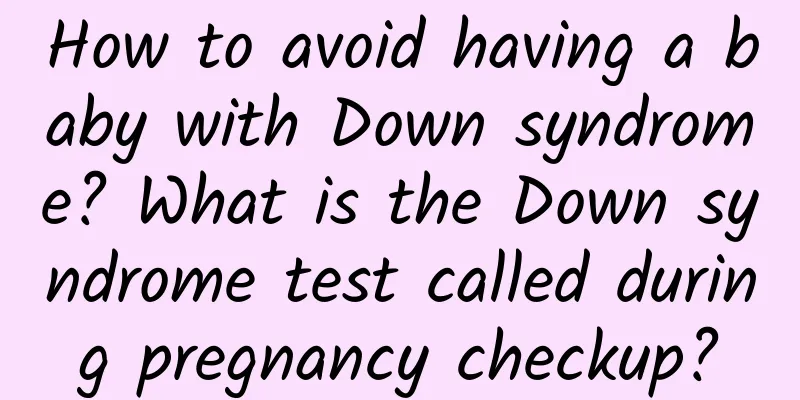How to avoid having a baby with Down syndrome? What is the Down syndrome test called during pregnancy checkup?

|
Many pregnant mothers do not want to give birth to unhealthy babies such as Down syndrome babies, which may be a burden to the family and not conducive to the life of the child when he grows up. Therefore, screening should be done well during pregnancy, early detection, and early measures should be taken. In addition, you can also pay attention to it in your daily life. How to avoid having a baby with Down syndrome1. Avoid giving birth at an advanced ageSince the incidence rate of babies born to older mothers is more than 5 times higher, it is best to give birth before the age of 35. Some patients are translocation type, and parents must undergo chromosome diagnosis and check for translocation before pregnancy. 2. Prenatal diagnosisIf you have given birth to a child with Down syndrome before, you will need to undergo prenatal diagnosis, namely chromosome karyotype analysis, if you want to have another child. 3. Regular pregnancy check-upsThere are screenings for Down syndrome in the early and mid-pregnancy. Pregnant women must attend on schedule to reduce the risk of Down syndrome. Down syndrome screening can be done around 16 weeks of pregnancy. 14-22 weeks of pregnancy is the best time to do non-invasive DNA prenatal testing. Compared with NT and Down syndrome screening, non-invasive DNA can screen for three major chromosomal diseases including Down syndrome, and the accuracy rate is also higher. 4. Pregnancy careDuring pregnancy, you should avoid exposure to harmful substances such as high radiation, pesticides, chemical pollution, etc., avoid viral infection, and do not take medication without authorization. If you have pets at home, you should vaccinate them in time and avoid too close contact. Pay attention to rest and maintain a good work and rest routine. 5. Avoid excessive miscarriages.For women who have frequent miscarriages, their endometrium is very thin and the intrauterine environment is easily in an inflammatory state, which is not suitable for the fertilized egg to take root and germinate, making the embryo more likely to miscarry or become deformed. What is the Down syndrome test called during pregnancy test?Depending on whether it causes trauma to the pregnant woman, prenatal diagnosis is divided into two categories: invasive technology and non-invasive (traumatic) technology. The former includes amniocentesis, chorionic villus sampling, frenulum puncture, fetoscopy and preimplantation diagnostic technology; the latter includes ultrasound examination, X-ray examination and magnetic resonance imaging examination, and detection of fetal genetic material in the blood of pregnant women. Prenatal diagnostic techniques for children with Down syndrome (or trisomy 21) mainly include fetal cell chromosome karyotype analysis, B-ultrasound testing, maternal serum marker screening and non-invasive prenatal diagnosis. Non-invasive DNA prenatal testing only requires drawing venous blood from the pregnant mother to detect the risk of the fetus suffering from trisomy 21 (Down syndrome), trisomy 18 (Edwards syndrome) and trisomy 13 (Patau syndrome). The accuracy rate of non-invasive DNA testing is as high as over 90%. What are the characteristics of children with Down syndrome?Distinctive facial featuresThe head is round and the occipital region is flat; the eye fissures are narrow and slanted, the distance between the eyes is wide, the inner corners of the eyes are fat, and there is often strabismus; the nose is flat; the mouth is small, the lips are thick, the tongue is large, the mouth is mostly extended, and the person drools; the ears are small and low-set; the hands are of different lengths and the person has low intelligence. Abnormal skin texture on hands and feetThe fingers are short, the little finger is inward-bent and has a single fold; the trident point t in the palm line moves towards the center of the palm to form t', and the atd angle increases; the hand is connected; the distance between the first and second toes is wide (straw sandal toes), and there is an arched pattern on the tibial side of the ball of the toe, etc. Abnormal behaviorMental retardation, frequent giggling, slow movements, and almost inability to complete all movements; disordered language development, slurred speech, and a high incidence of stuttering; slow behavior, and some children will develop aggressive behavior; abnormal appearance, usually short stature. |
Recommend
How to take care of yourself after hysterectomy?
The uterus is a relatively important reproductive...
What foods should women eat to detox?
If women want to have smooth and fair skin, they ...
There is a cauliflower-like bump on the vulva
Vulvar growths are mostly considered to be flat w...
Does cupping affect menstruation?
People should not do cupping therapy when they ar...
Advantages and process of ultrasound diagnosis of breast diseases
Breast disease is one of the common health proble...
How to check your zodiac sign most accurately? What is the zodiac sign of the Morning Star?
The twelve zodiac signs can reflect a person'...
A brief discussion on the significance of social network data analysis
With the rapid development of information technol...
What to do if you have bloating in early pregnancy
In fact, women who have been pregnant know that b...
Is it normal for a woman to have a foul odor in her private parts?
If a female friend's vagina has a urine smell...
Peking Union Medical College doctor says | How to deal with acute sports injuries?
With the holding of the 2022 Beijing Winter Olymp...
What to do if you have menstruation during physical examination
No matter they are office workers or students, th...
How many days can I go out during a biochemical pregnancy?
Many people know that ectopic pregnancy is actual...
Pregnant women have calf pain when sleeping at night
Many women who have given birth can empathize wit...
The reason why women are healthier if they touch their breasts more
I believe everyone knows the importance of breast...









